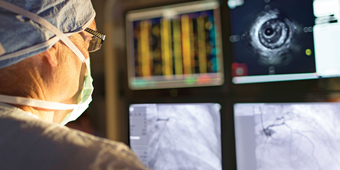Endometriosis’ Hide And Seek Makes Diagnosis Tricky

Find Your Perfect Match
Answer a few questions and we'll provide you with a list of primary care providers that best fit your needs.
Diagnosing endometriosis is not a quick and easy task. There’s no simple blood test to tell your doctor “this is it!” And because the symptoms are similar to those of other disorders, your doctor can’t rely on how you feel to determine if you have it. But while diagnosing is tricky, it’s crucial in order to get the proper treatment
What are Possible Symptoms?
- Pelvic pain that coincides with your period
- Killer cramps that don’t go away even with over-the-counter pain medications
- Periods lasting more than seven days with heavy menstrual flow
- Infertility
- Pain during intercourse, bowel movements, urination
If you have endometriosis, you might experience some or all of these common symptoms. But even when you recognize the symptoms, there’s only one way to know for sure if you have endometriosis.
Dr. Heather Hilkowitz explains how endometriosis is diagnosed:
Click play to watch the video or read video transcript.
How Can I Know for Sure?
Imaging methods like MRI and ultrasound may detect nodules or cysts that can form inside you as a result of endometriosis. But they won’t detect the small lesions (they look like cigarette burns) that are a telltale sign, explains Kamlesh Sanghvi, MD, Northwest OB-GYN Inc.
The only way your doctor can be certain that you have endometriosis, says Dr. Sanghvi, is with laparoscopic surgery that provides a look inside your pelvic area. The procedure involves placing a tube into a tiny incision in your abdominal area. The surgeon then places a thin camera-like instrument into the tube to look for endometriosis. This provides your doctor what he needs to determine whether you have endometriosis, and if yes, to what degree. Sometimes a tissue sample is taken. When the tissue is examined, it can further confirm that you have the disease.
The only way your doctor can be certain that you have endometriosis, says Dr. Sanghvi, is with laparoscopic surgery that provides a look inside your pelvic area.
Be Your Own Advocate
The difficulty in diagnosing endometriosis makes it important that you see a doctor who is experienced with the disease. Talk to your primary care physician about seeking the advice of an experienced gynecologist and ask for a referral.

Dr. Sanghvi suggests carefully tracking your symptoms prior to your appointment. “Your notes will help us identify when your symptoms are most obvious, and help us more quickly zero in on how severe your condition might be,” he says. Bring these answers to your appointment:
- Do I have pain with every period? Before? During? After?
- How would I rate the pain on a scale of 1 to 10?
- Do painkillers make the pain go away? How much?
- How long do my periods last, and how heavy are they?
- Is intercourse painful? Always, or only during certain times of the month?
- When does my pain get worse?
Find Your Perfect Match
Answer a few questions and we'll provide you with a list of primary care providers that best fit your needs.
Source: Endometriosis Foundation; National Institutes of Health; Endometriosis.org; Kamlesh Sanghvi, MD, Northwest OB-GYN Inc.; Heather Hilkowitz MD, Hilltop Obstetrics and Gynecology





